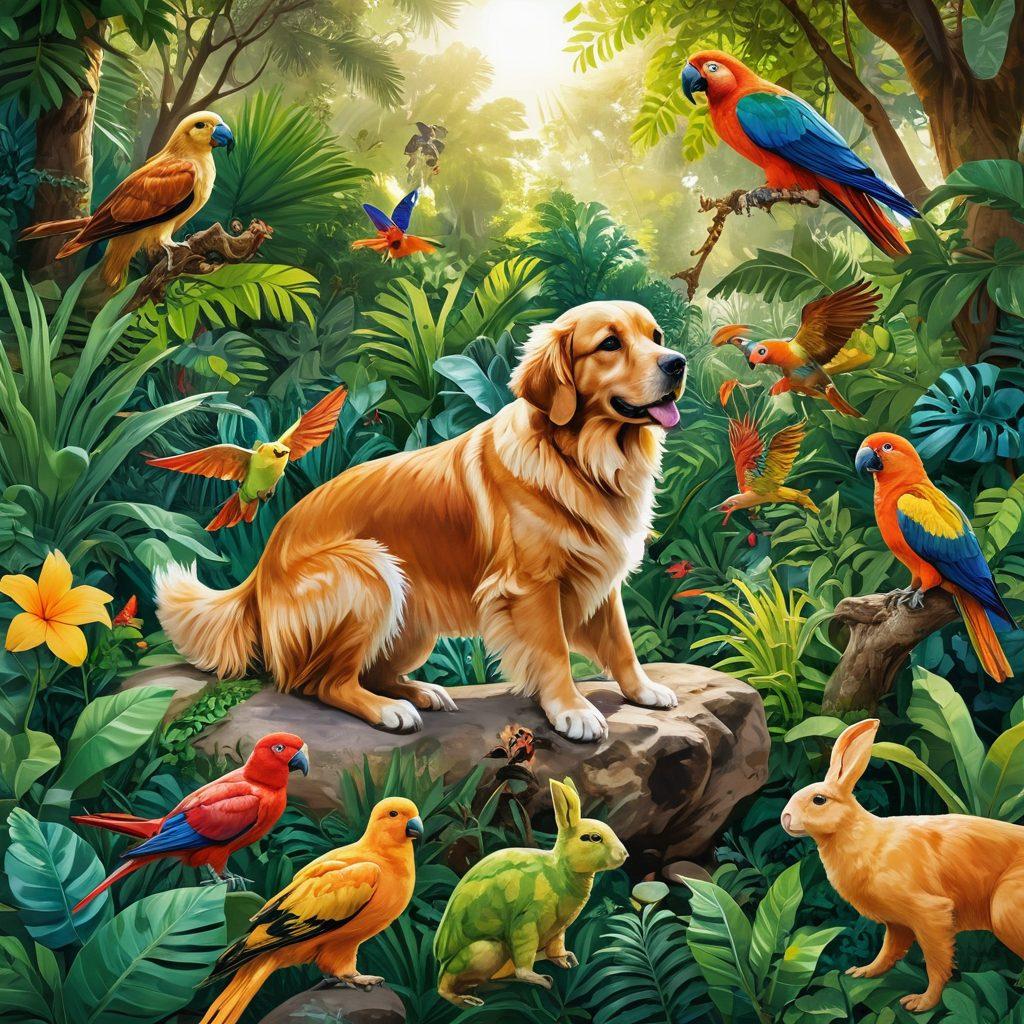Paws & Claws: Essential Tips for Pet Care and Animal Welfare
Have you ever looked into the eyes of your dog or cat and felt a deep connection that transcends words? These moments remind us that our pets are not just animals; they are companions who fiercely love us and rely on our care. As responsible pet owners, we have a crucial role to play in ensuring the health and happiness of our beloved pets. In this comprehensive guide to pet care and welfare, we'll explore essential tips and raise awareness about animal rights, pet nutrition, and the nuances of animal behavior, ensuring that our furry friends lead a fulfilling life.
Pet care is not merely a matter of filling a food dish or providing a roof over your companion animals' heads. It's about nurturing their physical and emotional well-being. Just as we manage our own health, our pets deserve the same consideration. Regular veterinary care is vital for monitoring the health of domestic animals, preventing illness, and catching potential issues early. Ask yourself, when was the last time you had a check-up for your pet? Schedule regular veterinary visits to give your pet the best chance at a long, happy life. Remember, prevention is always better than cure!
Nutrition is a cornerstone of animal health, yet it's a topic often riddled with myths and confusion. The truth is, the right diet can transform an animal's well-being. Each species possesses unique nutritional requirements; for example, exotic pets may require specialized diets compared to dogs and cats. Researching proper pet nutrition can feel overwhelming, especially with so many options available. Why not consult with a veterinary nutritionist? They'll guide you in making the best dietary choices for your particular pet. After all, what you feed your pet is an act of love!
Training is another crucial aspect of pet care that enhances the relationship between you and your companion animal. It’s not just about teaching them tricks; pet training fosters good behavior, boosts their confidence, and provides mental stimulation. Have you thought about the last time you engaged your pet in training? Reinforce a bond of trust and respect through positive reinforcement techniques. Remember, patience is key, and training sessions can be a fun, engaging way to spend quality time together. Look out for animal stories where dogs become service animals or cats learn to open doors; these tales often start with simple training moments!
As passionate advocates for animal welfare, our responsibilities extend beyond our furry companions. In a world where wildlife conservation is paramount, consider how we can support and protect their habitats. You can share your passion through animal blogging or wildlife photography, raising awareness of the beauty and fragility of our ecosystem. You may even find it rewarding to volunteer with animal rescue organizations, or participate in local programs for pet adoption. Every little effort counts towards improving animal welfare and making a substantial difference for both domestic and wild animals. So, take the first step today—your pets and our planet will thank you!
From Adoption to Training: Ensuring the Health and Happiness of Your Furry Friends
Bringing a new pet into your home is one of life's greatest joys. The moment you lock eyes with your future furry friend at the rescue shelter or adoption center, a sacred bond is formed. But, as you embark on this journey, how do you ensure that your companion animal thrives in their new environment? This post will dive deep into essential tips for pet care and animal welfare from the first moments of adoption to the ongoing responsibilities of training and health care. After all, our pets rely on us to provide a safe, nurturing space to grow and explore.
One of the biggest questions many potential pet owners face is: "Should I adopt a domestic animal or an exotic pet?" The answer lies in understanding both their needs and your lifestyle. For example, dogs and cats are often seen as traditional companions, but exotic pets can bring a unique spice to your life. Whatever your choice, ensure that you’re informed about their pet nutrition and veterinary care requirements. Do your research before you jump into the world of pet adoption. Remember, a well-informed owner is a responsible owner!
The journey doesn’t end with adoption. Now comes the exciting yet challenging part—pet training! Training is not merely about teaching your companion animal how to sit or roll over. It’s about creating a positive environment that fosters good animal behavior. Forming a solid bond through training can significantly reduce the likelihood of behavioral issues later on. Ever heard the saying, 'A trained pet is a happy pet'? It's true! Plus, think about how fun those training sessions can be—filled with challenges, laughter, and even a few 'oops' moments! Do you have your own hilarious training stories to share?
What about ongoing health and wellness? Just like humans, pets require regular check-ups to ensure their animal health is maintained. A visit to the veterinarian should be seen as a vital part of pet care. Additionally, keeping your pet's grooming standards high by maintaining their physical condition fosters both good hygiene and bond-building moments. Ever try giving your dog a bath? It's a slippery, splashing adventure that is always memorable. What can you do to elevate your pet's grooming game?
Don’t forget about the importance of animal welfare and rights. In an increasingly connected world, educating yourself and advocating for wildlife conservation is more important than ever. You can share your own animal stories through your social media platforms or animal blogging to raise awareness. This not only shines a light on critical issues facing domestic and exotic pets but also inspires others to take action. So, what story can you share today that may help an animal in need? Your small act could lead to significant changes in animal habitats and welfare.
Wildlife Wonders: Bridging the Gap Between Domestic and Exotic Pet Care
When we think of pets, our minds often drift toward the lovable, tail-wagging dogs or the purring cats that greet us at the door. But amidst the joy they bring, we must also recognize the treasures of the animal kingdom beyond our homes. The world is teeming with exotic pets, from colorful parrots and playful ferrets to slithering snakes and curious lizards. These fascinating creatures challenge our notions of traditional pet care, demanding a unique understanding of their habits, diets, and habitats. In ‘Wildlife Wonders: Bridging the Gap Between Domestic and Exotic Pet Care,’ we explore how compassion for all animals can result in rich, harmonious relationships, whether it’s with a companion animal or a rare exotic fellow. Are you ready to delve into this captivating world that lies just beyond your doorstep?
As a pet owner, you’re likely familiar with the essential aspects of pet care. You know about pet nutrition, regular veterinary care, and routine grooming. But caring for exotic pets comes with its own set of challenges. They often require specialized environments and diets to thrive. For instance, did you know that an iguana needs a specific temperature and humidity to feel at home? Or that certain birds thrive on a diet that includes fresh fruits and vegetables in addition to their seeds? Understanding animal behavior and the intricate needs of each species can make all the difference in their quality of life. Just like dogs need walks for exercise and mental stimulation, exotic pets have their own unique demands. How well do you know your pet's needs?
Breaching the gap between domestic and exotic pet care doesn’t just stem from technicalities; it begins with compassion and empathy towards all animals. Think of animal rescue stories that brighten your day, showcasing the incredible bond between humans and their furry or scaly friends. When we open our hearts and homes to these creatures, we also begin to value wildlife conservation and animal welfare on a broader scale. Let’s consider the importance of habitats, both domestic and wild. Every time we adopt a pet or support wildlife photography, we contribute to a larger narrative of animal rights. Raising awareness about endangered species and advocating for wildlife ensures a better future for all animals. In what ways are you supporting animal welfare?
Have you ever considered writing your own animal stories? Blogging about your experiences with pets—whether domestic or exotic—can be a powerful tool for pet training and education. Sharing tips on animal care not only strengthens your relationship with your own animals but can also help others learn about the nuances of caring for various species. Social media platforms and blogs have become valuable resources for pet owners, allowing like-minded individuals to connect and share their experiences; you can join in this conversation! What if you could inspire someone else to adopt a rescue animal or make a positive change in their pet’s care?
In conclusion, keeping an open mind about pet care enriches our understanding of both domestic animals and exotic pets. Whether it’s prioritizing animal health through proper nutrition and routine veterinary visits or delving deeper into the world of wildlife conservation, we have the power to create a positive shift in the way we think about pets. Every pet, regardless of its background, deserves love, respect, and proper care. By bridging the gap in our knowledge and compassion for both domestic and exotic creatures, we not only ensure their welfare but also strengthen our connection to the wonderful world of animals. So, what will you do next to enhance your pet care journey?


